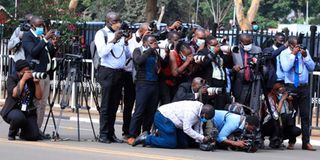CJ Koome: Judiciary will stand for editorial independence of media

Journalists cover President Uhuru Kenyatta's arrival at parliament buildings for the State of the Nation address on November 30, 2021.
Chief Justice Martha Koome has challenged editors to be at the forefront of steering the media industry towards editorial independence and political neutrality during the electioneering period.
The CJ assured the media that the Judiciary is firmly behind it as journalists exercise their freedom to work for the benefit of democracy, adding that scribes should not be agents of political actors during this period.
In a speech delivered to a convention held by the Kenya Editors Guild, CJ Koome said that in an emerging democracy like Kenya, the need for robust checks and balances and scrutiny of those in power and public institutions is greater than ever.
“The growth of our democracy demands that both public and private media houses assert editorial independence. Editorial and journalistic independence is a cherished value that goes to the heart of your vocation,” she said in a speech delivered by her chief of staff, Ms Rose Macharia, at the 4th annual convention of the Kenya Editors Guild at the Great Rift Lodge, Nakuru County.
She said the pursuit of editorial independence has become more urgent and vital in an electioneering context such as the one that Kenya is headed to, adding that the media and the Judiciary are bedfellows given that the two institutions were indicted for contributing to the 2007/08 post-election violence.
Noting that the media occupies a pre-eminent position in ensuring vitality of public discourse, the top judicial officer said Kenya’s democracy relies to a large extent on the role of the media in making information publicly available and uncovering information by scrutiny and investigation.
But despite the crucial role the media plays, it faces an ingrained threat that at times hinders it from playing its public role effectively.
“Of all the checks and balances built into a representative democracy – elections, parliaments, independent democracy – the media is the only one whose success is measured commercially,” said the CJ, noting that this has at times been a weakness for media owners.
Training judicial officers
She also revealed that the Judiciary is planning to train judges, judicial officers and staff on handling election disputes efficiently ahead of 2022.
The institution is engaging stakeholders including other arms of government and agencies on the need for adequate funding and provision of services like security that will ensure optimal conditions for timely and just determination of electoral disputes.
She also urged the media to adopt a more “activist role” to help it fulfil its historic function as the Fourth Estate.
“This will necessitate embracing a more activist role that involves asserting the media’s own voice in commentary and analysis, scrutinising the consequences of the utterances and policy proposals by political actors, and promoting the idea of peaceful national co-existence and resolution of any electoral disputes





